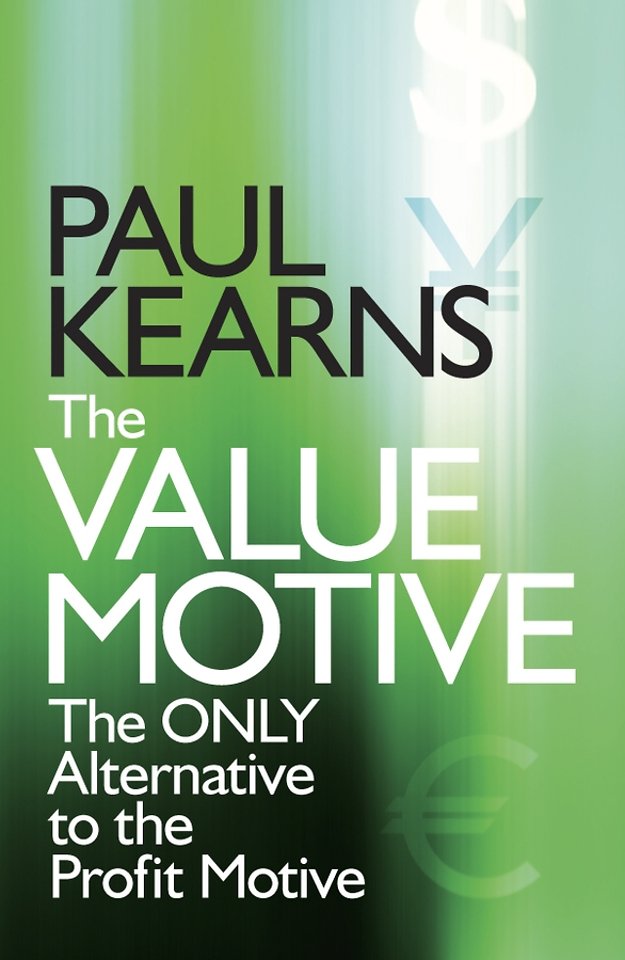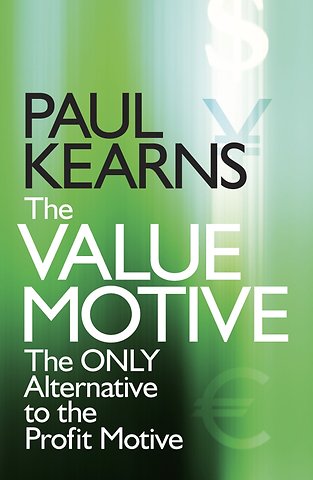The Value Motive
The Only Alternative to the Profit Motive
Samenvatting
Our market system has evolved in line with capitalist philosophy, and at its heart is profit. But while profit can be a powerful motive, it is not always used responsibly and, in the worst cases, this can have damaging effects at a wider level. The calls for a corporate conscience grow louder, but no one has yet suggested an alternative to profit that people find as compelling. Profit is here and now.
In this climate, the solution is to refine the profit motive, not replace it. We all value things, and we re all motivated by what we value. If value could replace the profit motive, it would reconcile the interests of CEOs, shareholders, citizens and government. Profits would still rise but at the same time society would gain value. This book is a call to manage for maximum value to follow The Value Motive.
Kearns Endorsements
"In ′The Value Motive,′ Paul Kearns clarifies the confusing concept of ′value′ and shows how it can be used to transform thinking and action in organizations. Paul′s books are always stimulating and controversial, and this one is no exception. If you are interested in creating more value in your organization and willing to have your existing mental models challenged, then you should read this book!"
Dean Spitzer, Performance Measurement Thought Leader, IBM Research, and author of "Transforming Performance Measurement" USA
"I have worked with a host of HR professional over the years. To date I know of noone that compares to Paul when it comes to presenting the issues and challenges of managing human capital and providing practical approaches for doing so. Like his past books, The Value Motive, brings clarity to a world of HR, which often is filled with disarray and recommendations that tend to be driven by political correctness rather than by the intent to produce value. Paul′s discussion of value as a driving force in organizations (in addition to profit) brings together the worlds of for and not for profit organizations. It also provides an overarching theme that includes the best interest of all stakeholders, customers, community and shareholders alike. This certainly represents a very much needed approach."
Finnur Oddsson, Ph.D., Director of MBA Programs & Executive Education, Reykjavík University, Iceland
"This is a timely, forward–looking, and convincing exposition delving into why value is a better determination of sustained ROI than profit. Paul provides simple, yet valid methodology regarding how much value is added by any organizational activity. His writings are a must for anyone measuring the true effectiveness of people development, an organization s primary value–added activity."
Tery Tennant, Attainment, Inc, USA
Specificaties
Inhoudsopgave
<p>About the author.</p>
<p>Introduction.</p>
<p>Chapter 1. Profit is not a dirty word but value is much cleaner.</p>
<p>Is profit the best way to allocate scarce resources?</p>
<p>Profit can be a very emotive word.</p>
<p>The Microsoft Paradox.</p>
<p>Not–for–profit? Does that mean not–for–value?</p>
<p>Profit is an increasingly unpopular king.</p>
<p>Chapter 2. Value – a very slippery word indeed.</p>
<p>Defining value.</p>
<p>A working definition of value.</p>
<p>Basic Value.</p>
<p>Moving on to added value.</p>
<p>Private equity partners – value adders or asset strippers?</p>
<p>The value motive already exists..</p>
<p>Value as a distillation process.</p>
<p>Declaring value in a public statement.</p>
<p>The Value Agenda.</p>
<p>A value statement for a commercial company.</p>
<p>A value statement for a public sector organization.</p>
<p> Intangibles confuse the issue of added value.</p>
<p>Chapter 3. This powerful, motive force we call value.</p>
<p>Harnessing the power of motive.</p>
<p>Value means output, not input.</p>
<p>Defining value as an economic system.</p>
<p>Does the capitalist system deliver the best value?</p>
<p>When we say value we should really mean it.</p>
<p>A holistic, value system for everyone.</p>
<p>Chapter 4. Value has to be the raison d être for every type of organization.</p>
<p>All value is good.</p>
<p>Value is the raison d être of all organizations.</p>
<p>Corporate social responsibility (CSR) and the triple bottom line.</p>
<p>Social enterprise.</p>
<p>Is the public sector an obsolete construct?</p>
<p>Chapter 5. Organizational performance measurement has to measure value.</p>
<p>Turning human activity into value.</p>
<p>The advent of the scorecard.</p>
<p>The EFQM business excellence model.</p>
<p>Agreeing value priorities using the 3 Box System.</p>
<p>The gulf between performance measurement theory and practice.</p>
<p>Activity, performance and added value measures.</p>
<p>Taking a fresh perspective on the purpose of performance measurement.</p>
<p>Measuring and managing intangibles .</p>
<p>E–valu–ation.</p>
<p>Chapter 6. Value is essentially a people thing.</p>
<p>A fresh approach to people management.</p>
<p>Measuring the value of people.</p>
<p>De–bunking the employee–customer–profit chain theory.</p>
<p>Replacing performance management with value management.</p>
<p>Managing value holistically.</p>
<p>Valuing people ?intangibles?</p>
<p>Chapter 7. The people measurement box .</p>
<p>Only meaningful measures count.</p>
<p>People measurement is a really serious matter.</p>
<p>Does diversity add value?</p>
<p>Human capital management, a revolution in management thinking.</p>
<p>People – are they personnel, human resources, assets or capital?</p>
<p>Human capital measures and indicators of value.</p>
<p>Chapter 8. How the value motive could upstage the profit king.</p>
<p>The value motive is leadership.</p>
<p>The politicians definition of value.</p>
<p>The first, second and third sectors have to become one.</p>
<p>Value special cases and dead losses.</p>
<p>Value management education.</p>
<p>Auditing the value motive.</p>
<p>A new management discipline – valuing the human contribution.</p>
<p>Index.</p>
Anderen die dit kochten, kochten ook
Net verschenen
Rubrieken
- aanbestedingsrecht
- aansprakelijkheids- en verzekeringsrecht
- accountancy
- algemeen juridisch
- arbeidsrecht
- bank- en effectenrecht
- bestuursrecht
- bouwrecht
- burgerlijk recht en procesrecht
- europees-internationaal recht
- fiscaal recht
- gezondheidsrecht
- insolventierecht
- intellectuele eigendom en ict-recht
- management
- mens en maatschappij
- milieu- en omgevingsrecht
- notarieel recht
- ondernemingsrecht
- pensioenrecht
- personen- en familierecht
- sociale zekerheidsrecht
- staatsrecht
- strafrecht en criminologie
- vastgoed- en huurrecht
- vreemdelingenrecht







